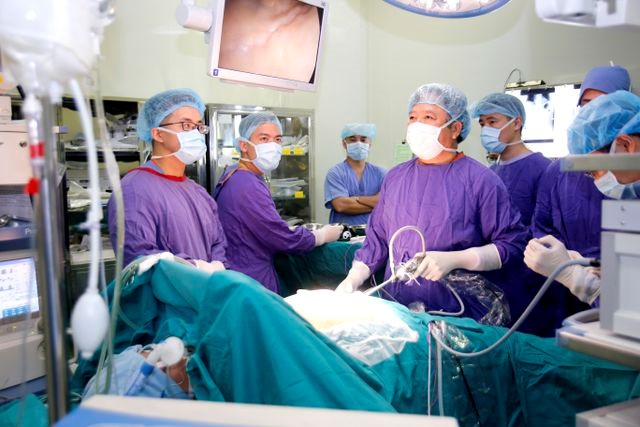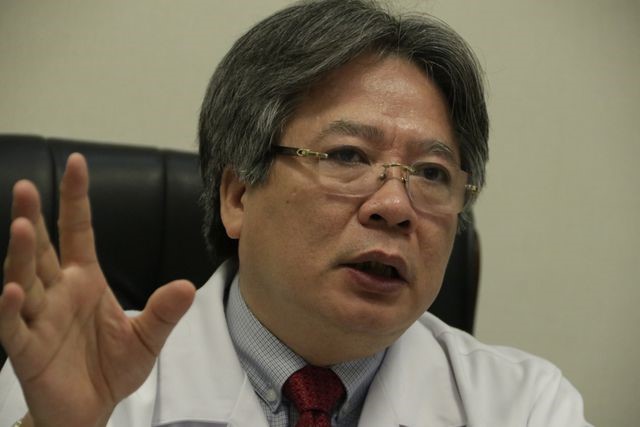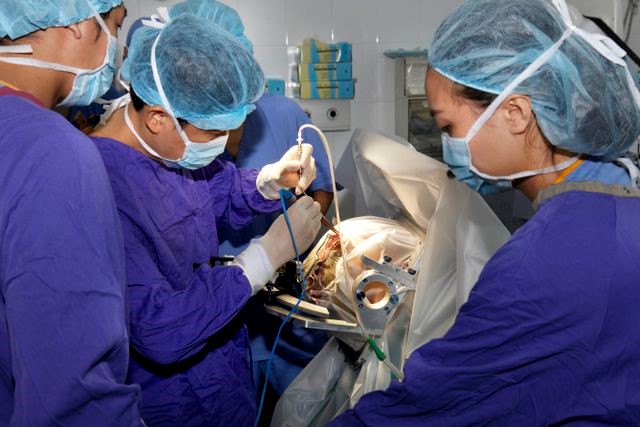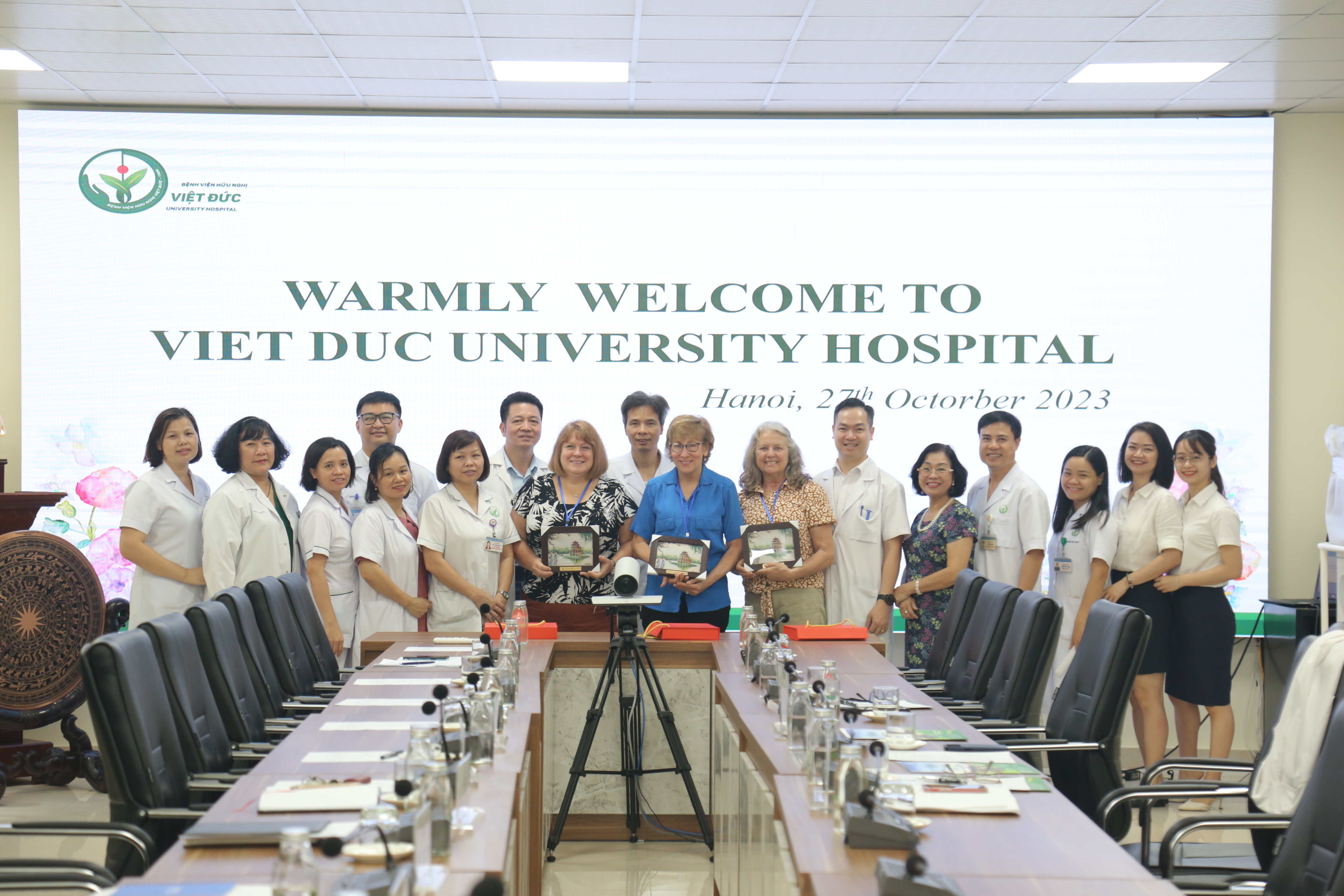The delivery of “aristocratic surgery” of Europe “coverage” throughout Vietnam
17/12/2019 08:24
For patients with gastrointestinal surgery, the most obsessive thing is the large incision in the abdomen causing a very long recovery time; the patient actually undergoes a major surgery. When laparoscopy was born, from the long incision doctor only “punched” 3 – 5 holes on the abdominal wall, until now there are interventions that only need to “pierce” 1 hole, even without “piercing” the hole as doctor goes through the body’s natural hole.
Terminated the skeptical about laparoscopic surgery
Cluster of research “Application of advanced laparoscopic surgery treatment for some abdominal diseases” by the author – Prof. Tran Binh Giang, Director of Viet Duc University Hospital who achieved first rank of Vietnam Talent Award in the field of Medicine and Pharmacy in 2019 once again affirmed the values of gastrointestinal laparoscopic surgery.

Mr. Mai Tien Dung – Member of the Party Central Committee, Minister, Head of the Government Office came to the stage with Ms. Nguyen Thi Doan to award the First Prize in the field of Medicine and Pharmacy to the awarded persons.

Prof. Tran Binh Giang, Director of Viet Duc University Hospital receives first rank of Vietnam Talent Award 2019 in the field of Medicine and Pharmacy.
Prof. Tran Binh Giang, Director of Viet Duc University Hospital said, in Vietnam, laparoscopic surgery is one of the scientific fields that is close to the development of this specialty in the world. In 1987, the first laparoscopic surgery in the world was performed, after only 5 years, Vietnam conducted the first laparoscopic surgery. Prof. Giang was one of the first to perform gastrointestinal laparoscopy and has grown to become a strength that reminds us of Viet Duc University Hospital when it comes to digestive laparoscopy.
Prof. Giang shared, when he first saw French specialists perform a laparoscopic case while in the last semester in France, he was surprised by the change so big for patients. From a large, long incision site on the abdomen, it was replaced with a few small holes in the abdominal wall can still effectively solve the disease. He wished he could bring this technology to Vietnam, but this was considered a “noble surgery” at a high cost in Europe, so he did not think Vietnam could deploy it so soon.

Prof. Tran Binh Giang (at the center) in a case of gastrointestinal laparoscopy for patient
“We have the support from teachers who have never done laparoscopy but strongly support the students. Without those supports, we could never have done it” Prof. Giang shared.
Up to now, after nearly 30 years working in the field of gastrointestinal laparoscopy, he still remembers the first laparoscopic surgery that he had done 27 years earlier.
This is a case of reflux esophagitis. This disease occurs when the “valve” to prevent broken, the doctor will have surgery to repair. This is a very difficult surgery when open the esophagus, but with laparoscopy, there is a better chance because the instrument can be inserted into it to make it clear.
“The feeling of performing my first laparoscopy is very happy. I am happy, because I have proven against the disturbing opinions about endoscopy, saying that ” small incision surgery can not compare with the big incision surgery anymore”, feeling proud for not betraying the trust of teachers who believe and encourage me to operate”, Prof. Giang shared.
As one of the first participants in laparoscopic surgery, Prof. Giang assessed laparoscopic surgery to bring about a revolution for patients, replacing heavy open surgery, slow recovery after surgery and the rate of complications after surgery is also very high.

Prof. Tran Binh Giang, Director of Viet Duc University Hospital
“I am always grateful to the teachers who have supported to bring an aristocratic operation of European aristocracy to Vietnam and nowadays, it provides the best treatment opportunity for patients”, Prof. Giang shares.
Expand to many pathologies
The first laparoscopic surgery in the world, people like the “atomic bomb”. In Vietnam, the first case taken in 1992 also caused a stir among the medical community because with only a small incision, it had solved the disease that had previously had to be “opened”, with a long incision, long-term recovery.
“With laparoscopic surgery, the physician can both directly see the damage and repair and treat the injury that the patient has to undergo a minimal invasive surgery on the abdominal wall, the patient loses less blood during surgery, less pain after surgery and can restore health after surgery earlier than conventional open surgery “, Prof. Giang said.
Therefore, Viet Duc University Hospital has conducted many research projects, including the topic “Research on the application of advances in laparoscopic surgery in the treatment of some abdominal diseases” with the results 7 application process of laparoscopic surgery in the diagnosis and treatment of some abdominal diseases such as laparoscopic procedure of esophageal shaping in gastric esophageal cancer; Laparoscopic procedure for loss of function; Laparoscopic procedure of pancreatic mass; one port laparoscopic surgery for 1 appendectomy; one port laparoscopic surgery for cholecystectomy; The procedure of laparoscopic surgery to remove the appendix via natural orifice by experiments; Laparoscopic procedure via vaginal surgery to remove the appendix.
With two difficult areas of cephalic duodenopancreatectomy, pancreatic cancer, laparoscopic surgery has also confirmed great progress.

The reduction from the long incision, the surgery to 3-5 holes, then down to 1-hole (one port) laparoscopy, through the body’s natural endoscopy has reduced the best impact for patients, effective treatment of disease.
“These are large, complex surgeries and laparoscopic surgery that have brought significant benefits compared to open surgery. Cephalic duodenopancreatectomy by laparoscopy was also performed in Vietnam for the first time, but no one had thought it could be done before because it was a difficult technique” Prof. Giang evaluated.
Laparoscopic surgery helps patients avoid a major surgery, relieve pain, help patients lose blood, limit antibiotics and the best thing is not having to stay in the hospital for a long time. Previously, open surgery patients hospitalized for a dozen days, now 2-3 days the patient was discharged.
From the first laparoscopic surgery, primary cholecystectomy, appendectomy so far thanks to laparoscopic surgery, people can perform the most complicated surgeries such as kidney, liver, stomach, cephalic duodenopancreatectomy… laparoscopic surgery has interfered with most organs, accounting for a high proportion of general surgeries in many countries around the world.
“From large abdominal incisions, laparoscopic surgery only pierce 3 to 5 holes, then proceeds to a hole, not even a hole when intervening through the body’s natural holes, reducing the best impact on patients, after just one day the patient can return to normal life”, Prof. Giang said.
In particular, to suit the conditions of Vietnam, Prof. Giang and his colleagues have made appropriate improvements. As with Western countries, laparoscopic surgery is very expensive because specialized medical materials will do it once and then throw away. In Vietnam, doctors have been creative in technology, even though one-hole laparoscopy (only one hole per patient’s stomach is pierced), the conventional materials for laparoscopy is still used, so the cost is not much increased.
Not only performed within the hospital, Viet Duc University Hospital transferred the laparoscopic surgery technique. Up to now, most large centers and provincial hospitals nationwide have performed many laparoscopy routine techniques, greatly reducing the burden on patients like open surgery.
Prof. Giang said: “It can be said that any of the most advanced laparoscopic techniques in the world we are working on. Our machines, equipment, people are not inferior to them. Therefore, Vietnamese people can completely trust the quality of domestic medicine instead of going abroad for treatment”.
Hồng Hải – Nam Phương/Báo Dân Trí











